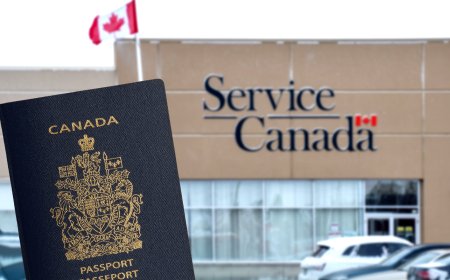Ontario Eases Immigration for Nurses and Trade Workers
Ontario eases immigration for healthcare and trade workers through OINP updates, adding new pathways and expanding eligible occupations to address labor shortages.

Ontario Simplifies Immigration for Nurses and Trade Workers
Ontario is simplifying the immigration process for healthcare professionals and skilled trade workers through updates to its Ontario Immigrant Nominee Program (OINP). These changes, affecting the Express Entry’s Human Capital Priorities and French-Speaking Skilled Worker streams, along with the Employer Job Offer In-Demand Skills stream, aim to attract more top-tier talent and address workforce challenges.
The provincial Immigration Minister emphasized the importance of newcomers in fostering economic growth and inclusivity in Ontario. He highlighted the province's efforts to expand immigration pathways and remove barriers for skilled professionals, particularly in healthcare.
A significant change exempts nurses registered with the College of Nurses of Ontario from needing a bachelor’s degree to qualify for the OINP Express Entry streams. This applies to job categories such as:
- NOC 31300 – Nursing coordinators and supervisors
- NOC 31301 – Registered nurses and registered psychiatric nurses
- NOC 31302 – Nurse practitioners
- NOC 32101 – Licensed practical nurses
This exemption provides internationally-educated nurses with more opportunities to gain provincial nomination and addresses the urgent need for healthcare workers in Ontario’s long-term care homes.
The OINP is also broadening the scope of the Employer Job Offer: In-Demand Skills stream, increasing eligible occupations from 22 to 56. This expansion follows consultations aimed at aligning the program with the province's labor market needs. New occupations include:
- NOC 14400 – Shippers and Receivers
- NOC 14402 – Production logistics workers
- NOC 65320 – Dry cleaning, laundry and related occupations
- NOC 74200 – Railway yard and track maintenance workers
- NOC 74203 – Automotive and heavy truck and equipment parts installers and servicers
- NOC 74204 – Utility maintenance workers
- NOC 74205 – Public works maintenance equipment operators and related workers
- NOC 75101 – Material handlers
- NOC 75119 – Other trades helpers and labourers
- NOC 75211 – Railway and motor transport labourers
- NOC 75212 – Public works and maintenance labourers
- NOC 85102 – Aquaculture and marine harvest labourers
- NOC 94101 – Foundry workers
- NOC 94102 – Glass forming and finishing machine operators and glass cutters
- NOC 94103 – Concrete, clay and stone forming operators
- NOC 94104 – Inspectors and testers, mineral and metal processing
- NOC 94112 – Rubber processing machine operators and related workers
- NOC 94120 – Sawmill machine operators
- NOC 94121 – Pulp mill, papermaking and finishing machine operators
- NOC 94123 – Lumber graders and other wood processing inspectors and graders
- NOC 94142 – Fish and seafood plant workers
- NOC 94143 – Testers and graders, food and beverage processing
- NOC 94200 – Motor vehicle assemblers, inspectors and testers
- NOC 94202 – Assemblers and inspectors, electrical appliance, apparatus and equipment manufacturing
- NOC 94203 – Assemblers, fabricators and inspectors, industrial electrical motors and transformers
- NOC 94205 – Machine operators and inspectors, electrical apparatus manufacturing
- NOC 94211 – Assemblers and inspectors of other wood products
- NOC 94212 – Plastic products assemblers, finishers and inspectors
- NOC 95100 – Labourers in mineral and metal processing
- NOC 95101 – Labourers in metal fabrication
- NOC 95103 – Labourers in wood, pulp and paper processing
- NOC 95104 – Labourers in rubber and plastic products manufacturing
- NOC 95106 – Labourers in food and beverage processing
- NOC 95107 – Labourers in fish and seafood processing
The following occupation was added for positions located in any location in Ontario:
- NOC 75119 – Other trades helpers and labourers
The Ontario Retirement Communities Association supports these changes, recognizing the need for more healthcare workers to care for the aging population. The province is also increasing penalties for employers and recruiters involved in fraudulent activities, raising the minimum penalty to $10,000.
Ontario’s Health Minister underscored the government's commitment to growing the healthcare workforce and ensuring accessible care for residents. The OINP’s allocation from the federal government has more than doubled since 2022, reflecting Ontario’s proactive approach to addressing labor shortages.
The Residential and Civil Construction Alliance of Ontario praised the improvements to the OINP, emphasizing its role in attracting international construction laborers and skilled trades to meet the province’s labor market demands. These changes are seen as vital in supporting Ontario’s construction industry, especially with the anticipated retirement of many workers by the decade's end.
What's Your Reaction?
 Like
0
Like
0
 Dislike
0
Dislike
0
 Love
0
Love
0
 Funny
0
Funny
0
 Angry
0
Angry
0
 Sad
0
Sad
0
 Wow
0
Wow
0







































































